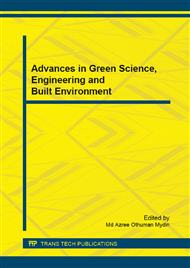p.97
p.101
p.105
p.109
p.123
p.127
p.132
p.136
p.141
Transport Policy in the Klang Valley, Malaysia: The Sustainability Agenda
Abstract:
There are many definitions of sustainable transport system, but generally it takes into account the three elements of sustainable development: the economy, the environment and the social well-being when deciding on policy that is affecting transportation activity. This paper examines the urban transport policy and its implications on sustainable transport agenda in the Klang Valley, Malaysia. The research utilizes a combination of primary and secondary data. Interview was employed to gather the primary data, while scholarly works, government documents and archival records are the instruments used for gathering the secondary data. The findings shed light on the implications of transport policy on sustainable transport agenda in the Klang Valley. The main challenge seems to be the lack of holistic measures in tackling transport issues that are in conflict with the objectives of sustainable transport. This main factor stems from a combination of several other issues such as decision-making based on short-term result that are mostly driven by economically viable alternatives, transport policies that are focused on technology and structural improvement and the lack of political will to influence development processes that could bring forward sustainable transport agenda. To achieve sustainability, transport policy in Malaysia, particularly in the Klang Valley, must include the wider systems in which transportation activity is rooted.
Info:
Periodical:
Pages:
123-126
DOI:
Citation:
Online since:
March 2015
Authors:
Keywords:
Price:
Сopyright:
© 2015 Trans Tech Publications Ltd. All Rights Reserved
Share:
Citation:


